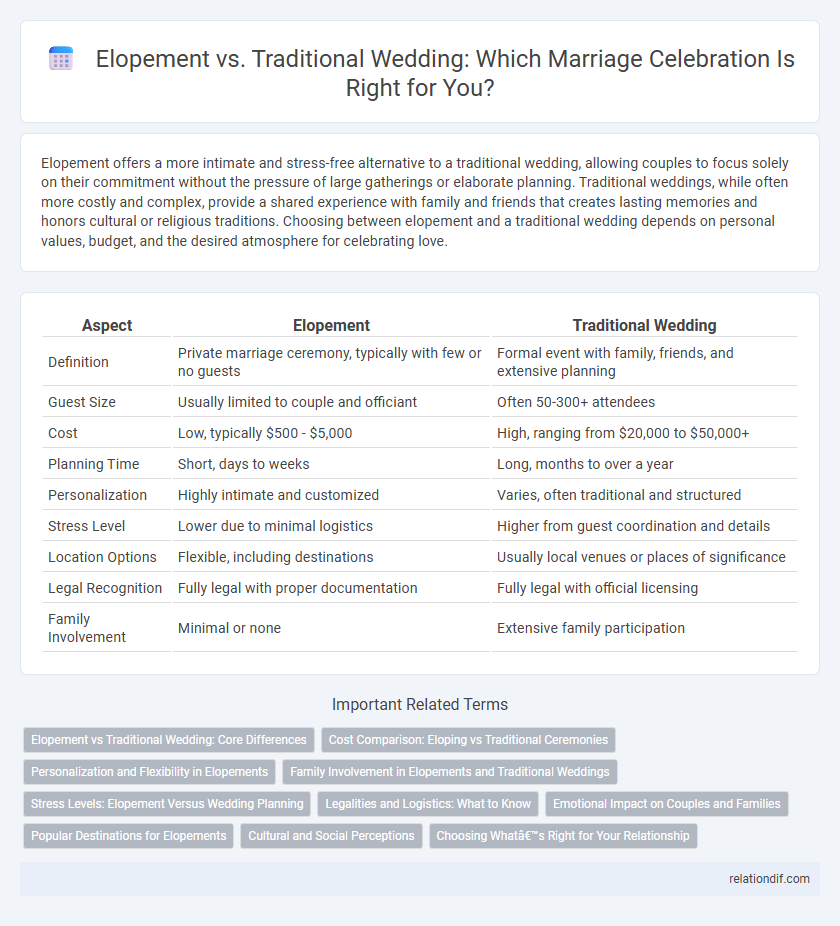Elopement offers a more intimate and stress-free alternative to a traditional wedding, allowing couples to focus solely on their commitment without the pressure of large gatherings or elaborate planning. Traditional weddings, while often more costly and complex, provide a shared experience with family and friends that creates lasting memories and honors cultural or religious traditions. Choosing between elopement and a traditional wedding depends on personal values, budget, and the desired atmosphere for celebrating love.
Table of Comparison
| Aspect | Elopement | Traditional Wedding |
|---|---|---|
| Definition | Private marriage ceremony, typically with few or no guests | Formal event with family, friends, and extensive planning |
| Guest Size | Usually limited to couple and officiant | Often 50-300+ attendees |
| Cost | Low, typically $500 - $5,000 | High, ranging from $20,000 to $50,000+ |
| Planning Time | Short, days to weeks | Long, months to over a year |
| Personalization | Highly intimate and customized | Varies, often traditional and structured |
| Stress Level | Lower due to minimal logistics | Higher from guest coordination and details |
| Location Options | Flexible, including destinations | Usually local venues or places of significance |
| Legal Recognition | Fully legal with proper documentation | Fully legal with official licensing |
| Family Involvement | Minimal or none | Extensive family participation |
Elopement vs Traditional Wedding: Core Differences
Elopement typically involves a small, intimate ceremony with few or no guests, prioritizing privacy and spontaneity, while traditional weddings are larger, often involving extensive planning, family participation, and formal rituals. Costs for elopements are generally significantly lower, avoiding expenses related to venues, catering, and large guest lists common in traditional ceremonies. Time commitment also differs, with elopements being quicker and less stressful compared to the lengthy preparations and coordination required for traditional weddings.
Cost Comparison: Eloping vs Traditional Ceremonies
Elopement offers a significantly lower cost alternative to traditional weddings, often ranging from $1,500 to $5,000 compared to the average $28,000 spent on conventional ceremonies in the United States. Traditional weddings typically involve expenses such as venue rentals, catering, and extensive guest lists, which can quickly escalate the overall budget. Couples choosing elopements save on these major costs by opting for intimate settings and minimalistic celebrations.
Personalization and Flexibility in Elopements
Elopements offer unparalleled personalization, allowing couples to design intimate ceremonies that reflect their unique values and preferences without adhering to traditional wedding norms. Flexibility in elopements enables choosing unconventional locations, timelines, and guest lists, creating a stress-free experience tailored to each couple's desires. Unlike traditional weddings often bound by extensive planning and social expectations, elopements prioritize authentic connection and meaningful moments.
Family Involvement in Elopements and Traditional Weddings
Family involvement in traditional weddings often includes extensive participation in planning, ceremonies, and celebrations, fostering strong communal bonds and shared memories. Elopements typically involve fewer family members or sometimes none at all, resulting in a more intimate experience but limited family engagement. The contrast highlights how traditional weddings emphasize collective family presence, while elopements prioritize personal connection over large gatherings.
Stress Levels: Elopement Versus Wedding Planning
Elopement significantly reduces stress levels compared to traditional wedding planning by eliminating the need for extensive guest lists, venue bookings, and detailed coordination. Couples who choose elopement typically experience greater emotional calm and intimacy, as they avoid the pressure of managing large-scale events and conflicting expectations. Studies show that traditional wedding planning often leads to heightened anxiety due to budget constraints, vendor negotiations, and time-consuming logistics.
Legalities and Logistics: What to Know
Elopement offers a streamlined legal process, often requiring fewer permits, witnesses, and paperwork compared to traditional weddings, which typically involve comprehensive legal formalities and vendor contracts. Couples opting for elopement must verify local marriage laws, obtain the necessary marriage license, and confirm the officiant's legal authority to solemnize the marriage. Traditional weddings demand extensive coordination of venue bookings, guest accommodations, and compliance with local regulations, making elopements a more flexible and legally straightforward alternative.
Emotional Impact on Couples and Families
Elopement often creates an intimate and stress-free experience that allows couples to focus deeply on their bond without the pressure of pleasing extended family and guests. Traditional weddings, by contrast, can foster a sense of communal celebration and strengthen family ties, though they may also introduce stress and conflict due to expectations and logistics. Emotional impacts vary widely, with elopements offering privacy and authenticity, while traditional ceremonies provide collective joy and shared memories that resonate across generations.
Popular Destinations for Elopements
Popular destinations for elopements often include scenic locations like beaches, mountain resorts, and charming small towns, offering intimate settings far from the crowds of traditional weddings. Santorini in Greece, Maui in Hawaii, and the Scottish Highlands attract couples seeking unique, picturesque backdrops that emphasize privacy and natural beauty. These locations provide a blend of serene landscapes and cultural charm, making elopements a favored choice over traditional large-scale ceremonies.
Cultural and Social Perceptions
Elopement challenges traditional wedding norms by prioritizing intimacy and personal choice over cultural expectations and large social gatherings. Many cultures view traditional weddings as essential rituals symbolizing family unity and social status, while elopements can sometimes be perceived as unconventional or even rebellious. The shift towards elopement reflects evolving social attitudes that value privacy, simplicity, and individual expression in marriage ceremonies.
Choosing What’s Right for Your Relationship
Elopement offers couples an intimate, stress-free way to exchange vows without the pressure and expenses of a traditional wedding. Traditional ceremonies provide a meaningful opportunity to celebrate with family and friends, creating lasting memories through shared rituals and cultural customs. Choosing the right option depends on your relationship values, budget, and desire for privacy or community involvement.
elopement vs traditional wedding Infographic

 relationdif.com
relationdif.com